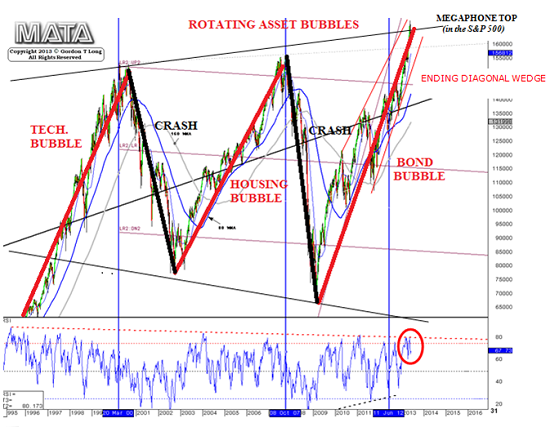Maybe This Is Why We Now Have a Serial-Bubble Economy
Who benefits from serial bubbles? The financial sector and the central government.

We should always bear in mind how lucrative asset bubbles are for the banks, the government, and super-wealthy insiders. The banks make money by loaning to speculators because their collateral gets a boost. As collateral is boosted, they can make loans to borrowers who are poor credit risks (no job, no income liar loans). Government makes money by taking a cut of speculative profits through taxes. Clued-in insiders get to ride the bubbles up and down, getting advance signals of the turns.
When Ben Bernanke says in effect of the housing bubble, “What bubble? We didn’t know there was any bubble. We don’t have any way to know if there is a bubble or not,” I am not impressed. The housing bubble of 1981-2006 gave rise to a huge expansion of the finance, insurance and real estate sectors; enriched government, which expanded greatly during those 25 years; and witnessed the emergence of super-wealthy who measure their wealth in the tens of billions.
To me, when Ben Bernanke says, “What bubble?” it is like a kid with chocolate all over his mouth, saying, “What cookies? I didn’t eat any cookies.”
Each asset bubble is a bonanza for the banks, government, and wealth insiders, and because those exact groups run this country, and because we have lived through serial bubbles since 1971, I say that if a person says there will be no more asset bubbles, the burden is on him to explain why. Why should the Powers That Be deny themselves a bonanza?
Those who managed the 2008 crisis (Bernanke, Paulson, and an assorted cast from Goldman Sachs), saw to it that the government and the Fed emerged unscathed. The Federal government is now much bigger than ever. They also saw to it that the TBTF banks emerged unscathed. They are now larger and more dominant than ever. Other super-wealthy such as Warren Buffett and George Soros also profited from the crisis.
Ben Bernanke is hailed as a genius for his masterful handling of the 2008 financial crisis. He may protest that he never saw the crisis coming, and that might even be true (though I doubt it), but he was well prepared to use the crisis to enrich the TBTF banks, the government, and super-wealthy insiders.
So in summary, because every asset bubble is a bonanza for the Powers That Be, I do not believe they blindly stumble into them. The work together as a team to engineer asset bubbles.
Things are falling apart--that is obvious. But why are they falling apart? The reasons are complex and global. Our economy and society have structural problems that cannot be solved by adding debt to debt. We are becoming poorer, not just from financial over-reach, but from fundamental forces that are not easy to identify or understand. We will cover the five core reasons why things are falling apart:
 1. Debt and financialization
1. Debt and financialization2. Crony capitalism and the elimination of accountability
3. Diminishing returns
4. Centralization
5. Technological, financial and demographic changes in our economy
Complex systems weakened by diminishing returns collapse under their own weight and are replaced by systems that are simpler, faster and affordable. If we cling to the old ways, our system will disintegrate. If we want sustainable prosperity rather than collapse, we must embrace a new model that is Decentralized, Adaptive, Transparent and Accountable (DATA).
We are not powerless. Not accepting responsibility and being powerless are two sides of the same coin: once we accept responsibility, we become powerful.
Kindle edition: $9.95 print edition: $24 on Amazon.com
To receive a 20% discount on the print edition: $19.20 (retail $24), follow the link, open a Createspace account and enter discount code SJRGPLAB. (This is the only way I can offer a discount.)
| Thank you, Cynthia W. ($10/month), for your extremely generous subscription to this site-- I am greatly honored by your support and readership. |



























